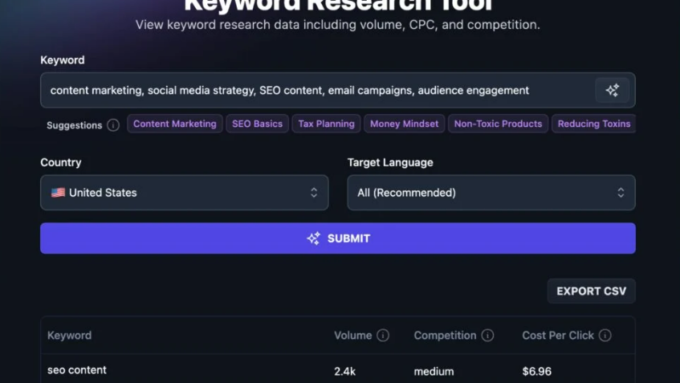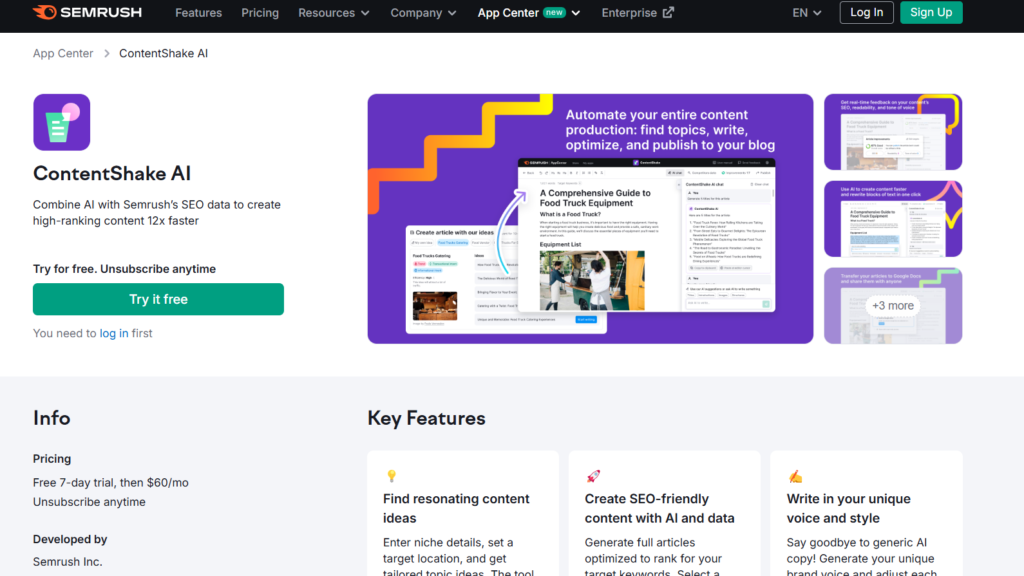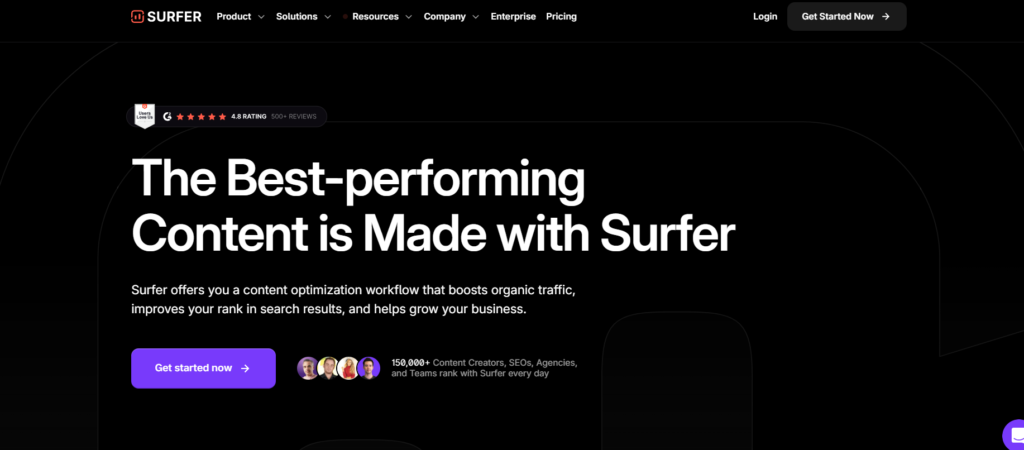
9 Top AI SEO Tools & How to Use AI for Writing and More: The Complete 2025 Guide

Artificial intelligence has revolutionized SEO, creating both challenges and unprecedented opportunities for marketers, content creators, and business owners. As search engines evolve and AI becomes more integrated into our digital landscape, one thing is clear: AI isn’t replacing SEO—it’s making you better at it when used correctly.
In this comprehensive guide, I’ll walk you through the top AI SEO tools of 2025, show you exactly how to leverage AI for content creation and optimization, and reveal the strategies that leading SEO experts are using to maintain and grow their organic traffic in the age of AI.
Whether you’re a seasoned SEO professional or just starting your journey, this guide will equip you with actionable insights to transform your approach to search engine optimization and content creation.
What Are AI SEO Tools and Why Should You Use Them?
AI SEO tools leverage artificial intelligence to automate and enhance various aspects of search engine optimization, from keyword research and content creation to technical SEO analysis and performance tracking.
These tools analyze vast amounts of data, identify patterns, and generate actionable insights that would be impossible or extremely time-consuming for humans to accomplish manually.
According to Semrush research, 68% of companies report higher SEO and content marketing ROI when using AI tools in their strategy. This statistic is particularly significant as we navigate the changing landscape of search in 2025.
The Impact of AI on SEO in 2025
The SEO landscape has undergone significant transformations with AI integration:
- Google’s AI Overviews: These summaries appear at the top of search results, answering queries directly on Google’s platform and potentially reducing click-through to websites.
- Zero-Click Searches: With more information provided directly in search results, users often get their answers without visiting websites.
- AI Chat Tools: ChatGPT, Perplexity, Google Gemini, and other AI chat interfaces now serve as alternative search platforms, changing how people find information.
- Content Creation Revolution: AI tools have democratized content production, but have also increased the importance of quality, expertise, and authenticity.
Victoria Kurichenko, an SEO expert, notes: “Whether we like it or not, AI is here to stay, and the smartest move is to learn how to use it effectively.” Source
9 Top AI SEO Tools to Transform Your Strategy in 2025
Let’s explore the nine most powerful AI SEO tools that can elevate your search engine optimization efforts in 2025. I’ve personally evaluated these tools based on their features, ease of use, and effectiveness for different SEO tasks.
1. ContentShake AI by Semrush

Best for: Beginners looking to create high-ranking content Pricing: $60/month for the Unlimited plan
ContentShake AI combines Semrush’s proprietary SEO data with AI to help create optimized articles from start to finish. It’s particularly valuable for those who aren’t SEO experts but need to create content that ranks.
Key Features:
- Weekly content ideas generation specific to your niche and location
- Content creation in your customized brand voice
- SEO data integration for keyword optimization
- AI image generation
- One-click WordPress publishing
What Sets It Apart: ContentShake AI automatically finds target keywords and analyzes SERPs to optimize content for search intent. The tool is extremely user-friendly, making it ideal for beginners while still offering powerful features for experienced users.
“I especially love that it finds your target keywords and analyzes SERPs to optimize content for search intent,” notes a Semrush expert. Source
2. Semrush Copilot
Best for: Getting personalized SEO recommendations Pricing: Available to all paid Semrush users (plans start at $139.95/month)
Semrush Copilot is an AI-powered assistant that analyzes your data across various Semrush tools and consolidates issues and action items into tailored recommendation cards.
Key Features:
- SEO data organization to help prioritize tasks
- Search performance analysis
- Regular competitor updates
- Daily alerts with issues and changes
What Sets It Apart: Semrush Copilot analyzes your data from multiple tools including Site Audit, Backlink Gap, Keyword Gap, Organic Research, Position Tracking, and Backlink Analytics. It then presents consolidated, actionable recommendations based on this comprehensive analysis.
3. Surfer SEO

Best for: Advanced users looking to create SEO content with AI Pricing: Starts at $89/month, with up to 30 articles at $19 each
Surfer SEO offers a comprehensive suite of tools for discovering keywords, creating outlines, optimizing content, and more. It’s particularly popular among content teams for its detailed optimization recommendations.
Key Features:
- Blog editor that combines AI and data suggestions
- Topic cluster generation
- Internal linking suggestions
- AI content detector and humanizer
- Google Docs extension
What Sets It Apart: Surfer SEO’s data-driven approach provides specific recommendations on content length, headings, and keywords based on what’s currently ranking. The tool also offers additional features like a topical map, SERP analyzer, and content audit tool.
“Surfer offers you a content optimization workflow that boosts organic traffic, improves your rank in search results, and helps grow your business.” Source
4. Koala AI Writer

Best for: SEO writers and website owners on a budget Pricing: Free plan available (5,000 words per month); paid plans start at $9/month for 15,000 words
Koala AI is a user-friendly content generation tool that offers extensive customization options before creating content.
Key Features:
- Customizable tone of voice
- Ability to specify word count and target keyword
- Outline customization
- Support for 100 different languages
- Competitive pricing structure
What Sets It Apart: Koala AI offers a generous free tier and affordable paid plans, making it accessible for smaller businesses and individual content creators. The tool allows for significant customization of the content generation process.
Victoria Kurichenko shares her experience: “I’ve been using Koala AI for a while to create content for my website… Combined with my expert insights and personal opinion, this AI-generated article now ranks in the top 10 for the target keywords.” Source
5. Clearscope

Best for: Content optimization and basic SEO analytics Pricing: Starts at $189/month
Clearscope is an AI content platform focused on keyword research, content optimization, and analytics. It helps improve existing content by analyzing published pages against target keywords.
Key Features:
- Keyword research and discovery reports
- Direct content optimization via URL
- Term map based on keywords
- Integration with Google Docs, WordPress, and MS Word
- Content brief generator
What Sets It Apart: Clearscope’s workflow involves analyzing existing pages and providing improvement suggestions based on competitors. It offers recommendations for target keywords, word count, readability score, content grade, and structure changes.
6. ChatGPT (and Other AI Chat Tools)

Best for: Brainstorming tasks and data analysis Pricing: Free version available; ChatGPT Plus costs $20/month
ChatGPT and similar AI chat tools like Google Gemini and Claude are versatile assistants that can help with multiple SEO tasks, though they lack specialized SEO data.
Key Features:
- Custom GPTs for specific SEO tasks
- Memory feature for consistent quality
- Automated CSV data upload and analysis
- Brainstorming capabilities
What Sets It Apart: While not specifically built for SEO, ChatGPT excels at tasks like keyword clustering, content optimization, data analysis, and brainstorming. It’s particularly useful for analyzing large datasets and generating creative content ideas.
A Semrush expert notes: “After using ChatGPT for months and analyzing the AI-generated content performance, I can say with certainty that ChatGPT is suitable for definitions generation, FAQ generation, outline creation, and explaining complex concepts in a simple way.” Source
7. SERP Gap Analyzer

Best for: Finding relevant keyword opportunities Pricing: $79/month
SERP Gap Analyzer helps discover low-difficulty keywords for your content plan, making it particularly valuable for websites in competitive niches or those with lower domain authority.
Key Features:
- Topic suggestions tailored to your website and industry
- Low-competition keyword recommendations
- Built-in AI writing tools for briefs and drafts
- SERP analysis documentation
What Sets It Apart: This tool analyzes search results for multiple keywords related to your main topic and presents the difficulty of ranking for each. It provides insights into global search volume, SERP weaknesses, and other valuable metrics to guide your content strategy.
8. Perplexity

Best for: Finding fresh information and examples for SEO content Pricing: Free plan available; paid plan costs $20/month
Perplexity is a conversational AI tool connected to the internet, allowing you to parse web content and find information quickly, making it valuable for content research.
Key Features:
- Real-time internet parsing
- Document upload capabilities
- Collections feature for organizing research
- Source citation
What Sets It Apart: Perplexity helps content creators find fresh information, useful examples, and current data without spending hours manually researching. It aggregates information from multiple sources and presents it in a conversational format.
9. RightBlogger

Best for: Comprehensive SEO content creation and optimization Pricing: Free plan available; paid plans with additional features
RightBlogger is a comprehensive toolkit that includes over 80 AI tools specifically designed for bloggers, marketers, and content creators.
Key Features:
- Keyword Research Tool
- People Also Ask tool for question research
- SEO Keyword Cluster Generator
- AI Article Writer for SEO-optimized content
- Content Gap Analysis
- Video-to-Blog and Blog-to-Video conversion
What Sets It Apart: RightBlogger offers a suite of interconnected tools that cover the entire SEO content creation process, from research and ideation to optimization and repurposing. It also includes the MyTone feature, which allows users to train the AI to write in their personal style.
Ryan Robinson, RightBlogger’s creator, explains: “AI can write a pretty strong first draft given enough prompting & information from you, but AI can’t replace you… We’re now in the era of needing to create experiences for your audience, and you need to earn that attention.” Source
How to Use AI for SEO Effectively in 2025
Now that we’ve explored the top tools, let’s dive into how to effectively use AI for various aspects of your SEO strategy.
1. Keyword Research and Content Planning
AI tools can revolutionize your approach to keyword research by:
- Uncovering long-tail opportunities: Tools like RightBlogger’s Keyword Research Tool and SERP Gap Analyzer can help identify low-competition keywords with reasonable search volume.
- Creating keyword clusters: AI can group related keywords into thematic clusters, helping you develop comprehensive content strategies. ChatGPT excels at keyword clustering when fed with your keyword data.
- Analyzing search intent: AI tools can help determine whether users are looking for informational, commercial, navigational, or transactional content, ensuring your content matches what users want.
Pro Tip: When conducting keyword research, focus on the “sweet spot” – keywords with low to medium competition and monthly search volume in the hundreds to low thousands. This positions you to rank for terms that aren’t as competitive but still have real search demand.
2. AI-Assisted Content Creation
The most effective approach to content creation with AI involves:
- Customizing AI to write in your style: Use tools like RightBlogger’s MyTone or provide custom instructions to ChatGPT to help AI better match your writing style and brand voice.
- Creating detailed outlines first: Instead of generating complete articles immediately, start by having AI create detailed outlines that you can review and refine.
- Adding your expertise and personal touch: Inject your personal experiences, case studies, and specific expertise to make the content uniquely valuable.
- Fact-checking AI output: Always verify facts, figures, and references provided by AI tools.
Victoria Kurichenko shares her approach: “I still create most of my website content in Google Docs, but I actively use ChatGPT to write definitions, FAQ questions, and comparisons. As long as your article is helpful and satisfies user search intent, Google won’t flag it as unhelpful.” Source
3. Content Optimization with AI
AI can significantly enhance your content optimization process by:
- Analyzing competitors: Tools like Content Gap Analysis and Surfer SEO can compare your content against top-ranking competitors and suggest improvements.
- Optimizing on-page elements: AI tools can help optimize meta titles, descriptions, headings, and content structure for better SEO performance.
- Enhancing readability: AI suggestions can improve sentence structure, paragraph length, and overall readability.
Checklist for AI-assisted content optimization:
- Ensure your target keyword appears in the meta title, meta description, H1, and within the first 100 words
- Use semantically related keywords throughout the content
- Check that heading structure follows a logical hierarchy
- Optimize image alt text and file names
- Ensure appropriate content length based on what’s ranking for your target keyword
- Add internal and external links to authoritative sources
- Include FAQ sections to target featured snippets
4. Content Repurposing with AI
AI tools excel at transforming content from one format to another:
- Blog to video scripts: Use tools like RightBlogger’s Blog Post to YouTube feature to convert written content into video scripts.
- Video to blog posts: Tools like RightBlogger’s YouTube to Blog Post can transform video content into written articles with proper formatting.
- Social media content: Generate platform-specific social posts to promote your content across multiple channels.
- Email newsletters: Create newsletters based on your content to share with your email subscribers.
Ryan Robinson explains: “Repurposing content is simple: Make one piece of content (say a video), then use AI tools to turn it into many more (like blog posts, social captions, a downloadable PDF version, graphics you can share, and more).” Source
Aligning AI Content with Google’s E-E-A-T Guidelines
Google uses Experience, Expertise, Authoritativeness, and Trustworthiness (E-E-A-T) as quality indicators for content. Here’s how to ensure your AI-assisted content meets these standards:
1. Demonstrate Experience
- Include personal experiences, case studies, and stories that reflect your firsthand knowledge
- Share practical examples from your own work or life
- Describe challenges you’ve faced and how you overcame them
2. Showcase Expertise
- Include author bios that highlight relevant qualifications and expertise
- Link to social profiles or other platforms featuring the author
- Mention awards, certifications, and recognition in your field
- Reference your sources properly
3. Build Authoritativeness
- Create comprehensive, in-depth content that covers topics thoroughly
- Link to authoritative external sources to support claims
- Encourage comments and engagement to build a community around your content
- Earn backlinks from reputable sites in your industry
4. Establish Trustworthiness
- Ensure information accuracy through fact-checking
- Update content regularly to keep it current
- Include clear contact information and about pages
- Provide transparency about your content creation process
Victoria Kurichenko notes: “If you use AI SEO tools to create AI-generated content, and your content is optimized for E-E-A-T, it can rank!” Source
Google’s Stance on AI-Generated Content
Google has provided clear guidance on AI-generated content, stating:
“Using automation—including AI—to generate content with the primary purpose of manipulating ranking in search results is a violation of our spam policies.” Source
In other words, Google doesn’t object to the use of AI in content creation, but rather to content created solely to manipulate rankings without providing value to users.
To stay on the right side of Google’s guidelines:
- Focus on creating valuable content that satisfies user search intent
- Use AI as a tool to enhance, not replace, human creativity and expertise
- Review and edit AI-generated content to ensure quality and accuracy
- Add your unique insights, experiences, and expertise
- Align content with E-E-A-T guidelines
Case Study: Real-World Results with AI SEO Tools
Let’s look at a real example of successful AI-assisted SEO from Victoria Kurichenko:

Victoria used AI tools like Koala AI and ChatGPT to create content for her website while adding her expertise and personal opinions. Her approach included:
- Thorough keyword research using tools like Semrush
- Creating outlines with ChatGPT and other AI tools
- Using AI to write definitions, FAQs, and comparisons
- Adding personal experience and opinions
- Including author bio information to establish expertise
- Optimizing content for target and related keywords
- Tracking performance and making adjustments
The result? Her website’s traffic grew steadily, and none of Google’s algorithm updates negatively impacted her site’s performance. Source
Common Pitfalls to Avoid When Using AI for SEO
While AI tools offer tremendous benefits, there are several common mistakes to avoid:
1. Overreliance on AI-Generated Content
The Problem: Publishing AI-generated content without sufficient human oversight and input.
The Solution: Use AI as a starting point, then add your expertise, personal experiences, and unique insights to make the content valuable and distinctive.
2. Neglecting Search Intent
The Problem: Creating content that’s technically optimized but doesn’t match what users are actually looking for.
The Solution: Analyze the top 10 search results for your target keyword to understand search intent before creating content.
3. Ignoring E-E-A-T Guidelines
The Problem: Failing to demonstrate expertise, authority, and trustworthiness in AI-assisted content.
The Solution: Include author bios, cite sources, add personal experiences, and ensure factual accuracy in all content.
4. Publishing Unedited AI Content
The Problem: Publishing AI outputs without thorough editing and fact-checking.
The Solution: Always review, edit, and enhance AI-generated content before publishing. Check for factual errors, improve readability, and add value.
5. Keyword Stuffing
The Problem: Using AI to cram keywords into content in an unnatural way.
The Solution: Focus on creating value for readers first, with natural keyword integration that prioritizes readability and user experience.
The Future of AI in SEO: Trends to Watch
- Google AI Overviews Example:

As we look ahead, several emerging trends will shape the relationship between AI and SEO:
1. AI-First Search Experiences
Google’s AI Overviews and similar features from other search engines will continue to evolve, potentially reducing traffic to websites but also creating new opportunities for visibility in AI-powered results.
2. Multimodal Search
Search engines are increasingly able to understand and index images, videos, and audio alongside text. AI tools that help optimize multimedia content will become more important.
3. Personalized Search Results
AI is enabling more personalized search experiences, making it even more important to understand your target audience and create content that resonates with their specific needs.
4. Voice Search Optimization
As voice search continues to grow, AI tools that help optimize content for conversational queries will become increasingly valuable.
5. Intent-Focused Content
Search engines are getting better at understanding user intent, making it crucial to create content that aligns with the specific problems users are trying to solve.
Ryan Robinson advises: “Don’t be afraid of AI. Embrace it as a tool to stay competitive, automate repetitive tasks, gather research, and create better content, faster. You have the power to use AI to augment your abilities, not replace them entirely.” Source
FAQ: Your Top Questions About AI and SEO
Will Google penalize AI-generated content in 2025?
Google doesn’t penalize content simply because it’s AI-generated. Instead, Google penalizes content that lacks value, regardless of how it was created. If you use AI to create high-quality, valuable content that satisfies user search intent and follows E-E-A-T guidelines, your content can rank well.
Victoria Kurichenko explains: “I think the most relevant and helpful content, aligned with users’ search intent and properly optimized for rankings, should rank higher.” Source
How is AI changing SEO in 2025?
AI is transforming SEO in several ways:
- Changing how people search with AI chat tools and voice search
- Increasing the importance of being featured in AI Overviews and similar features
- Making content creation more efficient but raising the bar for quality
- Enabling more sophisticated keyword research and competitor analysis
- Automating technical SEO tasks and providing more actionable insights
How do you choose the right AI SEO tool?
When selecting an AI SEO tool, consider:
- Your specific needs and goals (content creation, keyword research, optimization)
- Your level of SEO expertise (beginner-friendly vs. advanced tools)
- Your budget (free tools vs. premium options)
- Integration with your existing workflow and tools
- The quality of data the tool uses to generate recommendations
Victoria Kurichenko advises: “When choosing an AI tool for SEO, consider your specific needs and goals… Start with a ‘Why?'” Source
Can AI completely replace human SEO experts?
No, AI cannot completely replace human SEO experts. While AI tools can automate many tasks and provide valuable insights, they lack the critical thinking, creativity, and strategic decision-making abilities that human experts bring to the table.
Ryan Robinson states: “As a content creator, you’re the one with the relatable human experiences, stories, and personality—all of this needs to be injected into your AI-assisted writing, if you want it to stand out (and drive any real results for your business).” Source
How effective is ChatGPT for SEO?
ChatGPT can be a valuable tool for certain SEO tasks, including:
- Creating content outlines
- Finding resources to support your statements
- Paraphrasing and improving drafts
- Generating FAQs and definitions
- Analyzing data and suggesting optimizations
However, ChatGPT lacks real-time data and specialized SEO knowledge, making it better as a supplementary tool rather than a comprehensive SEO solution.
Conclusion: Embracing AI for SEO Success in 2025 and Beyond
AI is not replacing SEO—it’s transforming it. By embracing AI tools and adapting your strategies, you can stay ahead in the ever-evolving search landscape.
The most successful SEO practitioners in 2025 will be those who:
- Use AI to automate routine tasks and free up time for strategy
- Combine AI efficiency with human creativity and expertise
- Focus on creating valuable content that truly serves their audience
- Stay updated on AI developments and adapt their approach accordingly
- Maintain a strong foundation in SEO fundamentals while exploring new possibilities
#keywords=Artificial intelligence search engine optimization
Machine learning SEO software
Content optimization AI
Automated keyword research
SEO content generator
AI-powered rank tracking
Natural language processing for SEO
Semantic search optimization
AI content writing for SEO
Google’s AI algorithm
Neural networks for search optimization
AI-generated meta descriptions
Automated SERP analysis
GPT for content creation
AI competitor analysis
Voice search optimization
SEO automation tools
Predictive SEO analytics
Deep learning SEO tools
E-E-A-T optimization with AI
AI content detection
User intent analysis
AI for backlink strategy
Technical SEO automation
AI-powered content briefs
Search intent optimization
AI-driven keyword clustering
ChatGPT for SEO tasks
Search engine algorithm updates
Google’s helpful content system



